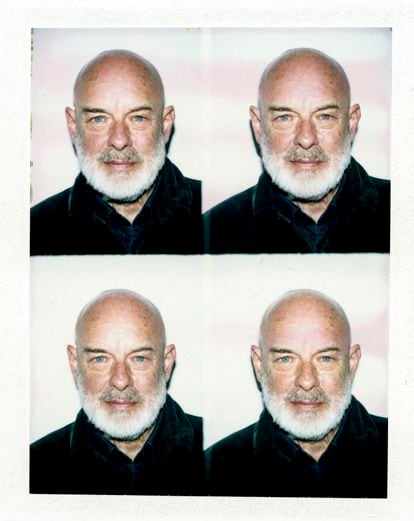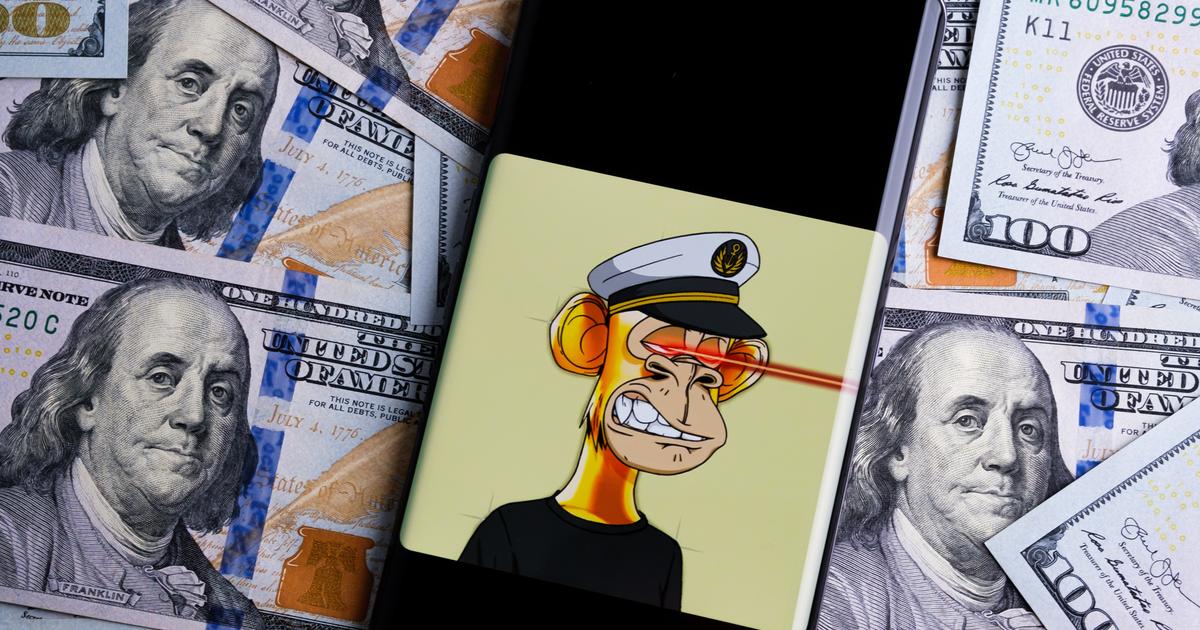Brian Eno in Norfolk, UK, on October 7, 2020 KALPESH LATHIGRA / New York Times / ContactPhoto (KALPESH LATHIGRA / New York Times / ContactPhoto)
Brian Eno is one of today's most accomplished artists.
Besides having given us the
ambient
genre , he has participated in some of the most relevant musical projects of the last 40 years.
He is famous for his sound, video and digital art works, including
77 Million Paintings
, which, with its generative spirit of abundance, is perhaps the opposite of what the NFT [non-fungible tokens, in English, digital certificates that give value to a digital file] represent. Eno once urinated in Duchamp's famous urinal, annoyed by the misinterpretation the gallery world was making of his artistic philosophy. Since I have known him for a long time - we share an interest in cybernetics and the work of Stafford Beer - I approached him to ask his opinion on NFTs and the political repercussions of the crypto economy.
If NFTs are the reverse of Duchamp's
ready mades
, as the American art historian David Joselit asserted in a short and commented essay in April 2021, who better to ask than the man who urinated in the
Duchamp
Fountain ?
QUESTION.
As an artist, you have always been in contact with economists.
He has collaborated with
Yanis Varoufakis
or
Mariana Mazzucato.
He was also one of the first public figures to defend
universal basic income
.
His political compass seems in tip-top shape.
What aspect of global capitalism could help us understand the context in which cryptoeconomics has become so important?
ANSWER.
I see a world awash with speculators and easy money, because world governments, reluctant to make real structural changes that endanger the
status quo,
have decided that the solution to any problem is to print more money.
That is probably why the stock market explodes when an emergency like covid occurs, because speculators know that a new emergency means more money and that much of it will end up in their hands.
Q. There is great enthusiasm for the crypto economy and many promises are made on behalf of these technologies.
What do you think?
A.
I see a package of solutions, but I don't know what other problems they are trying to solve other than "how can we use them to absorb all that cash around?"
What I hear the most is: "What can we do with these technologies?" Which does not mean "how can we make the world better," but "how can we turn them into money."
Q. In your opinion, are there many things that crypto technologies can do for artists?
R.
Although I imagine that there may be and perhaps there are already creative and interesting uses of crypto technologies, at the moment I do not see what effects they can have for artists.
I'm not sure they bring anything truly transformative to the world, apart from series of numbers running through bank accounts.
I want to know what is changing, what is being done differently, what is useful, what is transformative, and I don't see answers to these questions.
"The energy that drives the cryptoeconomy comes in part from the need for some to act outside the state"
Q. The outbreak of the NFTs has moved a lot of money in bank accounts.
Do you see cause for celebration?
A.
I understand that the people who have done well with the NFTs are happy; and in a libertarian world, it is logical that one believes that, if something is beneficial for him, it automatically has to be "good" for everyone. That conviction is a version of what I call "automatism," the idea that if we do nothing and let things - the market, nature, human will - take their own course, we will automatically get better results than if we did. we intervene. Those who think this way have no qualms about intervening and manipulating when it suits them, but they do not want others to do so.
P. Interestingly, current libertarianism seems to disguise itself as the savior of the world and speaks of community, decentralization and the need to disrupt established institutions (including central banks) under the banner of web 3.0. The irony is that it is the same thing that the big platforms that we associate with web 2.0 - Spotify in music, Uber in transport, Airbnb in accommodation - said about the sectors that they disrupted.
R.
The energy that moves the cryptoeconomy comes largely from the enormous need that some people have to act outside the State and, therefore, from any type of community and democratic supervision.
The prospect that the absurd ideas of Ayn Rand, that toxin that is a kind of Nietzsche for teenagers, end up enshrined in a philosophy of money is terrifying to me.
But what I still don't understand is what they think they have done.
Maybe it's just that I don't know.
Q. Why don't you venture into
the world of NFTs?
R.
They have proposed it to me many times.
So far I have not seen anything that convinces me that it is worth working in that field.
Making it “worth it” to me means creating something that adds value to the world, not just a bank account.
If my main objective had been to make money, I would have had a different career and I would have been a different person.
Surely he would not have been an artist.
In my opinion, NFTs are nothing more than a way for artists to get a small slice of global capitalism, our own version of financialization.
How cool: now artists can be little capitalist wimps too.
Q. On the left, there are those who say that some of these technologies could contribute to making the digital economy fairer.
Do you agree?
R.
Can NFTs be a contemporary variant of Robin Hood?
Perhaps artists can use these tools to divert part of the billions that are invested in more productive and humane directions?
That is what I would like to know, although it raises the interesting moral dilemma of whether it is possible to do good with money of shady origin.
And all this without mentioning the fundamental problem: that in a warming world, adopting a new technology that uses large amounts of energy as a “proof of work” - to establish a certain emblem of exclusivity - is insane.
All that energy is not being used to do anything we need.
Q. Is there any hope that we will take all of this more serenely in 2022?
A.
I am trying to be more receptive.
People I trust are convinced that NFTs are the eighth wonder, so I'd like to take a more positive view, but right now I mostly see scammers looking for the naive.
And a lot of dazzled and willing artists to play that role.
Forgive my cynicism… I'm not feeling very optimistic.
Translation by María Luisa Rodríguez Tapia.
Interview previously published in 'The Crypto Syllabus' (the-crypto-syllabus.com), crypto knowledge curation initiative.
Subscribe here
to the weekly Ideas newsletter.
Sign in to continue reading
Just by having an account you can read this article, it's free
Sign upLogin
Thanks for reading EL PAÍS






/cloudfront-eu-central-1.images.arcpublishing.com/prisa/TQZBOKCBUZFHZPEX2X4N7IR6GI.JPG)
/cloudfront-eu-central-1.images.arcpublishing.com/prisa/NO6PQFMULJF3JNPJGNL4OYPZGM.jpg)
/cloudfront-eu-central-1.images.arcpublishing.com/prisa/FLG6WOEBUVEFRNOKUNXWZXI72A.jpg)
